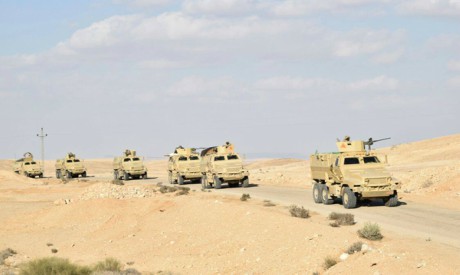
Egyptian Army during "operation sinai 2018' (Photo: Egypt's army spokesperson Facebook page)
There were very few patients at the Arish Military Hospital — which has 200 beds, three fully-equipped operating rooms and an intensive care ward — when we arrived.
Behind the calm, however, was a palpable sense of readiness, that the staff is prepared to deal with any emergency.
We were received by the hospital’s second in command. “We are fully equipped to save lives,” he said. “Routine surgery can be performed here alongside more specialised surgery. We have yet to receive a case with which we are not equipped to deal.”
The staff includes two surgical teams and orthopaedic, neurosurgical and other specialists. Although a military hospital, it often contracts civilian medical staff though during Comprehensive Operation Sinai (COS) 2018 “the basic staff in all disciplines is naturally drawn from the military medical corps.”
The hospital is expected to offer immediate treatment to personnel who sustain injuries in the course of military operations. Some cases are critical and require urgent intervention to save the patient’s life.
The most complicated cases may have to be transferred to hospitals with special facilities: the task of the hospital then becomes one of keeping the patient stable and facilitating his transfer.
“Sometimes I find that I have to transfer a patient to another hospital. We provide primary care in order to stabilise his condition so that he can be transferred safely to another hospital where he can receive treatment requiring a higher degree of specialisation. The cases we receive vary from simple wounds to neurological cases.”
The interview with the hospital’s deputy head was interrupted by the ringing of his phone. After hanging up he explained that general command calls him throughout the day for updates on patients.
Like other units in the Armed Forces the military hospital offers staff in-service training programmes to promote the transfer and development of expertise.
“We do this to introduce new physicians to the system as quickly as possible. The staff has to be alert and prepared to act at all times in an emergency. Emergencies are not the right time to give instructions which need to be familiar to staff in advance. The staff here is ready for any emergency.”
There were only two soldiers among the patients, a reflection of the low rate of injuries during COS 2018.
But what about the morale of the wounded soldiers?
“Each case tells a different human story. For example, a patient might get out of his bed in order to check on the welfare of a fellow soldier, whether or not he knows him personally. That same patient will want to get back to his post as soon as possible.
He doesn’t want to stay in the hospital and he doesn’t want to hear me, as a doctor, tell him that, in his condition, he needs more rest. In fact, it is we, here, who receive a dose of morale-lifting from these heroes and not the reverse. I imagine that events, here, have strengthened those men and made them closer to each other and more unified.”
According to the physician the ambulance services are very effective, something we were able to confirm on meeting an ambulance worker who had just brought a patient to the hospital.
Asked about first-aid services in COS 2018, he said the Egyptian Ambulance Organisation was responsible for transferring patients to hospitals. As for response time, the ambulance worker said: “I start moving the moment I receive a call. Generally, I get the rest of the information over the walkie-talkie while the ambulance is on the move.”
“Injuries are often a result of explosive devices,” said the young ambulance worker, who has been in service for a year.
The bombing of Al-Rawdah Mosque west of Arish in November was his worst time on the job because of the number of victims.
One of the main difficulties ambulance workers in North Sinai face, he said, is that ambulances themselves come under terrorist fire, something he experienced during the Al-Rawdah Mosque incident.
How did he react?
He continued to rescue the people he could and notified control an attack was in progress so the army could deal with it and prevent the obstruction of other ambulances coming to or from the scene of the bombing.
Back in the hospital we visited the two wounded soldiers. One had received a bullet in his left foot and the other had been shot in his right shoulder during a raid against a terrorist lair.
Both soldiers had undergone successful surgery. One had been discharged and was about to leave the hospital but he wanted to check up on his colleague and say good-bye first.
The moment he saw our camera, he said: “Please don’t photograph me. My injury is minor. I don’t want to get my family worried. I want to get back to my squadron and resume my duties.”
His companion echoed the same request. He too wanted to report back to duty as soon as possible. The physician was right: these soldiers do lift the morale of others.
The present reporter went to the nurses’ room. They were examining the lists of patients and one was on her way to the injured soldier to give him a scheduled dose of medicine.
They, too, shared a spirit of camaraderie generated by a joint sense of mission. One of the nurses, from Arish, said she was looking forward to the operation achieving its objectives and her home city being free from the threat of terrorism.
About work at the hospital another nurse said staff had all the facilities necessary to perform their tasks effectively.
A third said she had refused to take scheduled leave even though the hospital was well staffed.
“It’s enough for me that I know that they’re well and they know that I’m well,” she said.
*This story was first published in Al-Ahram Weekly
Short link: